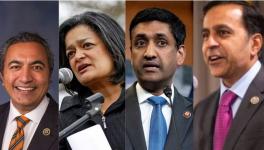Texas on the Cusp, March of Voter Suppression Laws in the US in 2021
Texas is in the news again, seemingly for all the wrong reasons. The state's governor Greg Abbott called a special session of the Texas House and the Senate for 30 days, to enact restrictive voting laws which decide how Texans will cast their votes and how these votes will be counted by election officials in future elections. Without any other viable option to stop these voter suppression laws, most of the Democratic party members of the Texas House have fled to Washington D.C. to deny a quorum to the majority Republicans. Will this dramatic tactic to run out the clock succeed in the end? What is going on in other Republican states regarding voter suppression laws?
For us to grasp what is going on in these states and why, let us briefly review the peaks and troughs of the voting rights laws in the US in the past.
19TH CENTURY VOTING RIGHTS LAWS
After the Civil War to abolish slavery in eighteen sixties, the US Congress passed the 13th, 14th and 15th amendments to the US Constitution to integrate the former slave population in the southern states into US society and granted them the right to vote. Within 20 to 30 years, the white supremacists in the south enacted highly restrictive state laws to selectively discriminate against the minority black voters (poll tax, literacy test etc.). Additionally, intimidation and highly publicised violence against blacks, including lynchings to death, was systematically used as a tool to terrorise the black population and deny them their right to vote. Neither the US Supreme Court nor the US Congress intervened to enforce the federal laws – a shameful and truly sad chapter of US history.
In the more liberal northern and western states, discriminatory voting laws and practices against the blacks and the recently-arrived working class immigrants from southern and eastern Europe, Mexico and China, were less violent, but more insidious (English language test, producing Naturalization papers while voting, Pauper Exclusion laws etc.). Through these legal means, the northern ruling elites among both the Republican and the Democratic parties mostly succeeded in suppressing the votes of the working class immigrant white voters and the minority black, Mexican and Chinese voters. This status quo continued in most of the nineteenth century and the first half of the twentieth century, until 1965.
Dear reader, does this targeting of minority voters, suppressing their votes and galvanising the majority community against them to win elections, sound familiar to you ?
VOTING RIGHTS ACT OF 1965
US Congress, shepherded by President Johnson in the aftermath of President Kennedy's tragic assassination in 1963, passed the truly historic Civil Rights Act of 1964 and the Voting Rights Act in 1965. These two laws dismantled the legal framework of racial segregation in all aspects in US society, including voting. Minority black and brown voters started voting in large numbers all across the US. As a result, they played a pivotal role in electing progressive mayors, Governors and lawmakers in states and in the US Congress – both minority candidates and progressive white candidates mostly voted in Democrats. Solid bi-partisan majorities in US Congress periodically renewed the Voting Rights Act. This was done most recently in 2006 with a vote of 98-0 in the US Senate.
FIRST NAIL IN THE COFFIN FOR THE VOTING RIGHTS ACT
The US Supreme Court struck down Section 5, one of the main pillars of the Voting Rights Act, in 2013. The court overturned the preclearance provision of any new voting law or rule change by the US Justice Department, since this provision applied to only the southern states. As per the court, US Congress based this criteria on fifty-year-old "outdated data''. The court ruled that the criteria used by the US Congress was "arbitrary". In order to reinstate this provision, Congress will have to use "objective criteria" based on recent data.
By 2013, the US Congress was highly polarised, mainly as a backlash against the election of the first black President Obama, in 2008, and again in 2012. Republicans in Washington controlled both the House of Representatives and the US Senate. They were no longer interested in strengthening the voting rights laws to protect the rights of the minorities. So, the Congress chose not to act after that Supreme Court ruling in 2013.
The southern states responded immediately by enacting a set of restrictive voting laws in the guise of increasing the integrity of the election process. Most of these laws adversely affected the black, brown and young voters disproportionately. In extreme cases, lower level federal and appeals courts nullified certain laws because of their "racially discriminatory" effect on the minorities. In one case, a federal judge observed that a voting district was drawn up by the state legislature with "surgical precision" to dilute the votes of the minority communities.
SECOND NAIL IN THE COFFIN
Ever since the November 2020 election, Donald Trump continued to claim that massive voter fraud was the reason he lost the election in the swing states. Trump's lawyers lost more than 50 cases in various state and federal courts, including the Supreme Court, for lack of any credible evidence. However, approximately half of the Republicans still believe that the 2020 election was stolen from Trump due to voter fraud!
Taking advantage of this backdrop, 17 Republican-controlled state legislatures have passed 28 restrictive voting laws in the last six months for the 'noble cause' of making the election process more secure. It was not a coincidence that these laws made it more difficult for the black, brown and young voters to vote, especially in urban areas.
In a landmark and highly consequential ruling this month, the recently-installed conservative majority, in a 6-3 decision, ruled that Section 2 of the Voting Rights Act may be invoked by the lower courts to strike down a restrictive voting law only when it has "substantial and disproportionate burdens on minority voters". As long as there are other ways to vote, an individual law with more burdens on working class or minority voters will be OK. This was a very high bar, suggesting that the Supreme Court will not overturn most of the restrictive recent laws passed by the Republican-controlled state legislatures. In this particular case, the Supreme Court upheld two restrictive laws recently passed in Arizona. One law adversely affected poor, black voters in urban areas with non-flexible work schedules. The second law adversely affected the Native Indian voters on reservations with no or sporadic mail service.
Richard L. Hasen, a leading election law expert at the University of California at Irvine, observed, "There is no question that the road is much tougher for voting rights plaintiffs in federal courts," going forward. This is a brutally honest assessment. But this development is not unprecedented. To this observer, it is a rerun of a 1890 movie when the Reconstruction era was sadly interrupted by the southern states and the Supreme Court refused to intervene to enforce federal laws.
Also Read: Cost of Deregulation? Human Sufferings in Texas Triggered by Power Outages for Days
VOTER SUPPRESSION LAWS ENACTED IN 17 REPUBLICAN STATES THIS YEAR
According to the prestigious non-partisan think-tank Brennan Center of Justice, 17 Republican-controlled legislatures and governors have enacted 28 laws in 2021. These laws made voting harder for the black, Latino and the young voters, which tend to vote Democratic. Currently, the minority black (15%), Latino (17%) and the Asian (five per cent) voters add up to 37% nationally. Many astute political observers concluded, that faced with an unfavorable demographic trend in the coming decades, the Republican lawmakers in various states decided to double down on limiting Democratic voter turnout in the guise of preventing "Voter Fraud". This has profound national implications since the same voters vote for both state and federal elections at the same time (President, US Senators and US House of Representatives).
This list of the 17 Republican states included critical swing states like Florida, Arizona, Georgia, Iowa etc. Some of these laws restricted early voting days and hours, reduced polling hours on Election Day, added multiple additional hurdles for mail-in voting, and more stringent voter identification laws to inconvenience the minority and young voters. Georgia and Iowa barred election officials from automatically mailing absentee (mail-in) ballots to all eligible voters in the state – a highly effective step which increased voter turnout in the 2020 election.
Additionally, 14 Republican states have enacted laws which increased control of the partisan state officials to oversee the election administration process. In Georgia, a Republican-controlled state commission has assumed the authority to remove local election officials, bypassing the County Election Board consisting of an equal number of members nominated by the County Republican and Democratic parties. The newly-formed State Commission in Georgia has done this already. In Florida, an election official who fails to supervise drop boxes continuously for mail-in ballots may be fined $25,000 - a hefty sum for a mid-level public official. Both in Arizona and Georgia, Republican Secretaries of State, who antagonised Donald Trump in 2020, have been stripped of their election oversight roles and replaced by their respective Attorneys General.
The Georgia State Legislature now has the authority to replace a County Election Board with a single partisan official. Additionally, the Georgia Legislature assumed the authority to overturn an election result certified by the State Election Board and the Secretary of State or the Attorney General – as suggested by Donald Trump in 2020. It should be noted that Georgia legislators themselves run for re-election every two years for a House member or six years for a Senator. Now, they can overturn an election result also being contested by them with allegations of "Election Fraud"! How convenient!
In The New York Times, Nate Cohn observed that the Election Administration provisions in the new bills are the "most insidious and serious threat to democracy" in the US.
WHY TEXAS HOUSE DEMOCRATS FLED TEXAS
Now that we have taken a tour of the voting rights landscape, we are ready to discuss recent developments in Texas. Texas is the big enchilada – a Mexican dish – or the big dosa, an Indian delicacy, because of its size and clout among the 50 states. It is already one of the toughest states for a voter to cast a ballot in. Faced with a pandemic in 2020, local election officials in Harris County in the Houston area implemented a set of innovative policies which resulted in significant increase in voter turnout.
In the 30-day special session of the Texas Legislature, Republican-sponsored bills barred most of the innovative provisions implemented in 2020 and added new restrictions :
- Ban the single, 24-hour voting during the early voting period to accommodate shift workers and the caregivers.
- Ban drive-through voting in cars
- Greatly expand the authority and the autonomy of the untrained partisan poll watchers inside the polling room, increasing fear of minority voter intimidation by muscle men. This law has really ominous implications in depressing voter turnout among minorities.
- Increase criminal penalties for election workers who make honest mistakes or flout regulations. A large percentage of poll workers are citizen volunteers trained by the County Election Departments.
- Add new voter identification requirements for voting by mail.
- Limit third-party collection of mail-in ballots except by family members or Election officials. Election officials rarely collect mail-in ballots.
The Texas constitution requires that two-thirds of the 150 House members must be present to conduct any official business. In order to protect the sacred right of the Texans to vote without impediment, most of the Democratic House members took a dramatic political stand by fleeing to Washington D.C. and denying the Republican majority a quorum. Julian Castro, a prominent Texas Democrat who served in the Obama cabinet and a former Mayor of San Antonio said, "What I see coming next for them (Texas Democratic House members) is to continue to be high profile and put pressure on Washington Democrats for federal legislation. I am convinced they will stay as long as necessary."
Also Read: How Did We Get to This Sad State in US Politics?
WILL TEXAS HOUSE DEMOCRATS' TACTICS WORK ?
Eventually, the Texas Democratic House members will have to return home to Texas to their families and jobs. With a paltry yearly salary of $7,200 per year, most of the Texas lawmakers have day jobs. As per the state constitution, Governor Abbott, a Republican, has the authority to call as many special sessions of the Texas Legislature as he wants. He has already indicated that he intends to do exactly that. So, the Democratic House and Senate members can stall and highlight the dangers to democratic foundations in the state when voting access is restricted for partisan reasons. But eventually, the Republican majority will get their way. They will enact most, if not all of the restrictive voting measures unless there is a voter revolt in Texas. Chances of that happening in 2021 is remote. The political tide is flowing in the opposite direction as of now. In order to placate the increasingly restive Republican base heavily influenced by misinformation campaigns and conspiracy theories, the Texas Republican majority enacted highly contentious and unpopular restrictions on abortion and further loosened already relaxed gun control laws during the regular legislative session in 2021.
PROSPECTS OF FEDERAL LEGISLATION ON VOTING RIGHTS IN 2021
This is a very hot topic drawing endless speculation by political pundits on both ends of the political spectrum. Congressional Democrats have drafted two ambitious Voting Rights bills. These bills are stalled in the US Senate because of filibuster threats by the Republicans. In order to proceed to actual debate on the floor, each bill has to get at least sixty votes in the Senate. In a 50-50 Senate, that will require the support of ten Republican senator, which is unlikely. Even a scaled-down version of a Voting Rights bill, if enacted, will rederess most of the recent voting access restrictions enacted by the Republican-controlled state Legislatures in 2021.
The Democrats have one viable go-forward path in 2021. If all 50 Democratic Senators agree to make a filibuster rule change to implement a carveout for Voting Rights bills, they can pass this filibuster rule change with a simple majority of 51-50 in the US Senate. The Vice-President, as the presiding officer of the US Senate, can cast a vote in case of a tie. There is already a precedent for this carve-out for filibuster rules in the US Senate. Budget bills can pass with a simple majority and cannot be filibustered in the US Senate.
Each Democratic Senator in the US Senate will have to look at themself in the mirror and answer a simple question: 'Is unhindered access of US citizens to vote in an election in the twenty-first century equally important as unhindered flow of green bucks to the US economy in the form of an approved budget?' Since all 50 Democratic Senators have to vote for a scaled down version of a Voting Rights bill, there will be zero margin for error. The leadership abilities and commitment levels of President Joe Biden and the Senate Majority leader Chuck Schumer, both Democrats, will be sorely tested on this critical issue in the coming months.
From the perch of this political observer, the prospect of the US Congress passing federal legislation on Voting Rights in 2021 is 50-50 at best.
Please stay tuned for a future column in Newsclick on the topic soon.
The author is a political activist and a US citizen based in Dallas, Texas. He has been living in the US for over 50 years. The opinions expressed in this column are author's personal views.
Get the latest reports & analysis with people's perspective on Protests, movements & deep analytical videos, discussions of the current affairs in your Telegram app. Subscribe to NewsClick's Telegram channel & get Real-Time updates on stories, as they get published on our website.
























